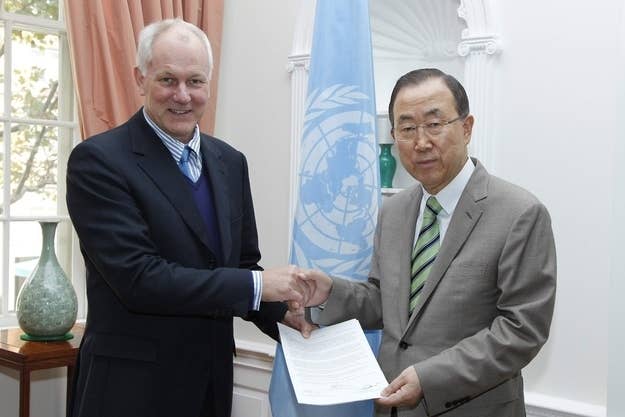
United Nations inspectors say that chemical weapons were used in a devastating attack in a Damascus suburb that left 1,429 dead and led to the U.S. call for military strikes against Syria — but the U.N. did not attempt to assign blame for the attack.
A team of scientists led by Swedish doctor Ake Sellstrom found that "the environmental, chemical and medical samples we have collected provide clear and convincing evidence that surface-to-surface rockets containing the nerve agent sarin were used," the report says.
"The conclusion is that chemical weapons have been used in the ongoing conflict between the parties in the Syrian Arab Republic ... against civilians including children on a relatively large scale," the report says. "In particular, the environmental, chemical, and medical samples we have collected provide clear and convincing evidence that surface-to-surface rockets containing the nerve agent sarin were used," the report adds.
U.N. Secretary General presented the report to Security Council members Monday, calling its findings "beyond doubt and beyond the pale."
"This is the most significant confirmed use of chemical weapons against civilians since Saddam Hussein used them in Halabja in 1988," Ban said, referring to the Iran-Iraq war. "The international community has pledged to prevent any such horror from recurring, yet it has happened again."
According to the report, 85 percent of the blood samples and nearly all the biomedical samples taken by investigators tested positive for sarin. A majority of inspectors' clinical assessments, environmental samples, and assessments of the rocket samples used also tested positive for sarin.
Inspectors did not attempt to assign any blame for the attacks, pointed out that it was possible for data in the rebel-controlled areas they visited to have been manipulated and issued their report "without prejudice" against their ongoing investigation into whether chemical weapons were used at several other sites. U.S., British, and French representatives said the report confirmed their earlier intelligence assessments that the regime was responsible for the attack, citing the professional weapons used, the regime's behavior prior to the attack, the trajectory of the rockets and the sarin itself. Sellstrom told council members that the sarin was of better quality than that used in the 1995 Tokyo subway attacks or the Iran-Iraq war.
"This does not point to a cottage industry chemical," United Kingdom U.N. ambassador Mark Lyall Grant said, referring to an earlier Russian assertion that a March 19 attack was carried out by rebels using improvised chemical weapons. U.S. U.N. ambassador Samantha Power said there is no evidence that rebels possess sarin gas.
Russian U.N. ambassador Vitaly Churkin insisted that it was too early to jump to conclusions and that members should work towards implementing the framework agreed upon by the U.S. and Russia on Saturday. Churkin did not rule out the possibility that the rebels had carried out the attack, which Russia says its intelligence shows, citing the lack of reports of casualties among opposition fighters. ""Is it theoretically possible to fire five or six rockets and miss your opponent?" he said.
The deal reached by U.S. Secretary of State John Kerry and his Russian counterpart Sergey Lavrov calls for a Security Council resolution to mandate that inspectors from the Organization for the Prohibition of Chemical Weapons — which Syria agreed to join late last week — be in Syria by November and that destruction or removal of the chemical weapons be completed by mid-2014.
If Syria does not comply, the framework calls for the use of Chapter VII of the U.N. charter, which can include economic sanctions and the use of force. "If Assad fails to comply," Kerry said in Paris Monday, "we are all agreed, and that includes Russia, that there will be consequences." Western countries insist that military strikes are still an option, but Russia says it would block any resolution involving the use of force. Ban urged the council to work together to enforce the framework.
Ban said at a U.N. meeting Friday that the report would show "overwhelming" evidence chemical weapons were used and that Syrian President Bashar al-Assad had "committed many crimes against humanity." Though Ban apparently did not know his comments would become public, a story in The Washington Post Monday credited his remarks with driving Russia to make a deal with the U.S. before the report was released.
A separate team of inspectors is set to release its findings on 14 other suspected chemical attacks later Monday, a U.N. war crimes panel chief said. The official, Paulo Sergio Pinheiro, said that both sides had committed war crimes, but that al-Assad's regime was also guilty of crimes against humanity.
More than 100,000 people have died in the two-and-a-half-year conflict, the vast majority from conventional weapons, according to the UNited Nations.
